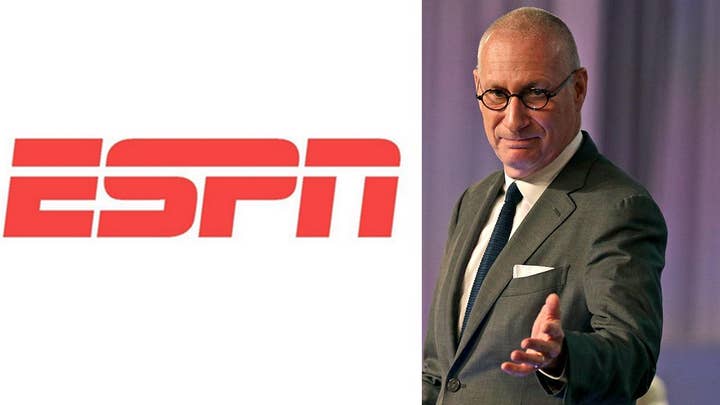Tucker: ESPN stands for 'Endless Stupid Political Nagging'
Tucker blasts sports network for not sticking to sports and entertainment and now becoming more known for political controversies, like the latest involving a commentator's Twitter rant where he calls Pres. Trump a white supremacist
John Skipper was furious.
One of his star anchors, Jemele Hill, had sent a tweet calling President Donald Trump a “white supremacist.” Mr. Trump’s supporters called for her to be fired. Prominent black athletes defended the anchor, who is African-American.
Sitting in his office last September, Mr. Skipper, then ESPN’s president, lit into Ms. Hill, according to people familiar with the meeting. If I punish you, he told her, I’d open us up to protests and come off as racist. If I do nothing, that will fuel a narrative among conservatives — and a faction within ESPN — that the network had become too liberal.
Mr. Skipper chose to spare Ms. Hill. Mr. Trump weighed in on Twitter : “ESPN is paying a really big price for its politics (and bad programming). People are dumping it in RECORD numbers.”
The president’s tweet was hyperbolic, but it tapped into real anxiety at ESPN. What was the way forward for a company shaken to its foundations by the cord-cutting revolution?
Executives at the sports-media giant wanted to seek out new audiences by spicing up shows with opinionated analysis and debate, including on SportsCenter, its struggling news and highlights franchise.
But the amount and intensity of political expression generated sharp internal disagreements over whether ESPN was appropriately taking part in the broader national conversation, or whether top executives were encouraging a divisive company culture and giving too much leeway to hosts to promote left-leaning views, both on air and on social media.
The amount and intensity of political expression generated sharp internal disagreements over whether ESPN was appropriately taking part in the broader national conversation, or ... giving too much leeway to hosts to promote left-leaning views.
Well before Ms. Hill’s tweet controversy, network icon Bob Ley had approached Mr. Skipper to say “there was a problem with balance internally,” people familiar with the matter said. Reached for comment, Mr. Ley said Mr. Skipper “was always extremely receptive.”
Linda Cohn, one of ESPN’s most prominent female anchors, in April 2017 gave a radio interview opining that ESPN’s politics were pushing away viewers and the network had overpaid for NBA rights. Mr. Skipper called to berate her on both counts, people familiar with the call said.
Why ESPN found itself torn up by the nation’s partisan politics traces back to its fundamental business challenge. Its status as cable TV’s most expensive channel had become a liability. As consumers grew fed up with their monthly cable prices, big cable distributors began offering discounted packages that didn’t include the network. Many consumers opted for those offers, while others cut the cord entirely, leading ESPN to shed 16 million subscribers over seven years.









